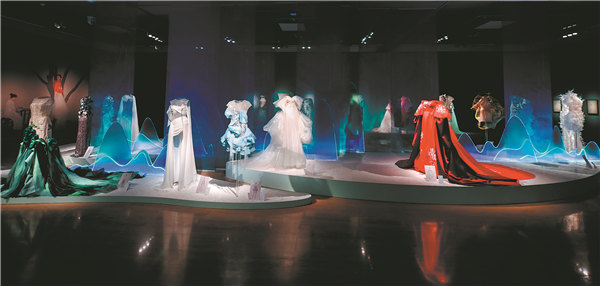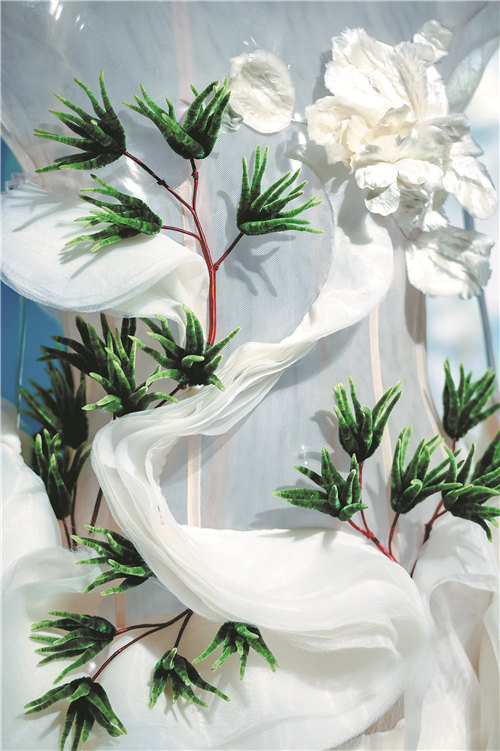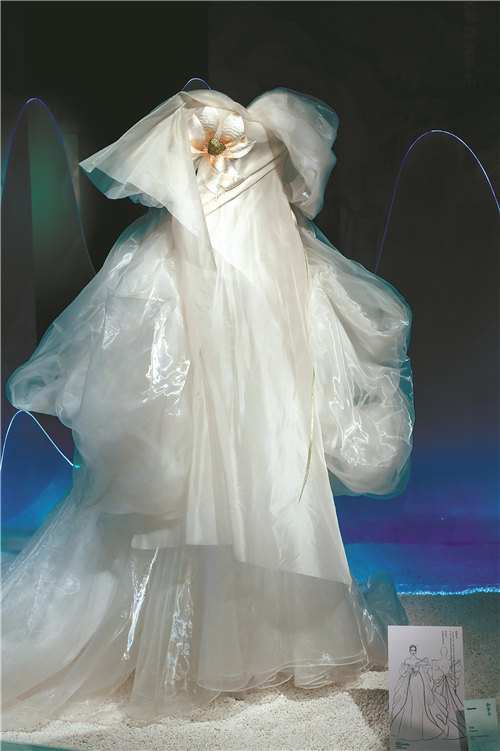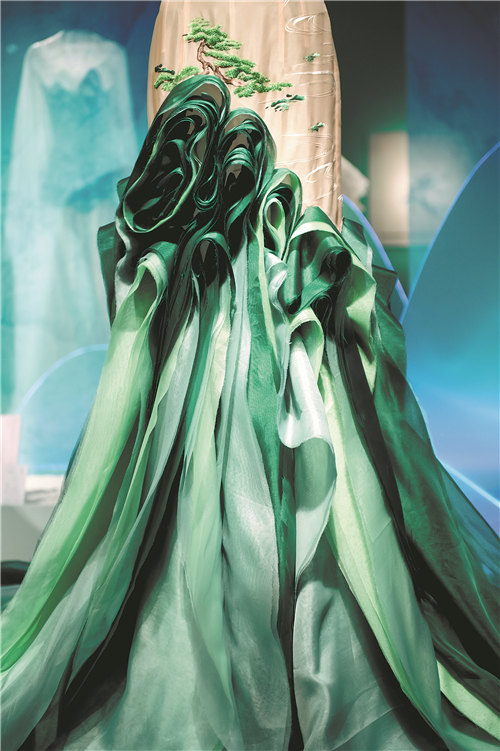
Her work is on display at an ongoing exhibition, Poetic Charm of Splendid Attire, at the National Art Museum of China. [Photo provided to China Daily]
Designer uses inspiration from culture to stitch together strands of creativity, Lin Qi reports.
Born into several generations of embroiderers, fashion designer Lan Yu remembers that her first piece of Su embroidery was a bib made for her by her mother Lan Tanghua, for use as a child at kindergarten.
"It was embroidered with red and yellow flowers and leaves, which encircled five characters in the center that read 'for little friend Lan Yu', which my mom wrote out on paper before she stitched them," recalls the designer, now in her 30s. "The other children wore plain white bibs, with no patterns. My bib made me feel special, because I had a mother who was so skillful. It showed her deep love for me."
Su embroidery is ranked among the four most celebrated kinds of Chinese embroidery. Originating in Suzhou — after which it is named — and spreading to surrounding areas in Jiangsu province, Su embroidery requires delicate workmanship, as exemplified by its variety of stitches and strong sense of color. For a long time, this form of artistry was passed down through women in the same family.
As she studied fashion design, both in China and abroad, Lan Yu has been attempting to blaze new trails for Chinese embroidery and her family heritage, to give the tradition a fresh look more in line with the tastes of the younger generation of customers from around the world.
She and her mother are currently sharing the fruits of their explorations at Poetic Charm of Splendid Attire, an exhibition that runs until Monday at the National Art Museum of China in Beijing. On show are dozens of recent designs inspired by classical Chinese poetry and paintings, as well as brocade pieces Lan Yu worked on with her mother, which create chemistry between the past and the present.

Her work is on display at an ongoing exhibition, Poetic Charm of Splendid Attire, at the National Art Museum of China. [Photo provided to China Daily]
"The pieces translate the spiritual world of ancient intellectuals into the context of fashion design, illustrating the lifestyle enriched by natural beauty and contemplation pursued in the poems of Tao Yuanming in the Eastern Jin Dynasty (317-420), and the optimism in the verses of Li Bai in the Tang Dynasty (618-907)," says Jia Ronglin, dean of the Beijing Institute of Fashion Technology.
"They usher the audience into a space of artistic pleasures, arising from the beauty of Chinese poetry, painting and brocade."
Growing up in the world of needlework, as a young teenager, Lan Yu did not think of taking on the family business. Her mother owned an embroidery atelier at the time, but having studied dance for years, Lan Yu hoped to become a dancer. However, injuries forced her to reconsider becoming either a dancer or a dance teacher. Still hoping to engage with art, she enrolled at the Beijing Institute of Fashion Technology.
"My mother half-jokingly asked, 'Will you be a tailor? For the rest of your life?' At the time, I felt that fashion design would allow me to imagine as freely as dancing on the stage, while also being a career for life," Lan Yu says.
During college, she was introduced to different styles of traditional embroidery from around the country, and came to understand the cultural accumulation behind the techniques, including her mother's, and began to feel her generation should take responsibility for keeping these traditions alive by incorporating elements of modern design.
"I felt that the sleeping part deep in me, the commitment of a craftsperson, had been awakened," she says.
For a long time, Su embroidery has enjoyed the reputation of being a kind of three-dimensional painting on silk, as its artisans have invented a variety of stitches to capture the details of real life and of paintings. Lan Yu has stepped to one side of this figurative tradition, and focuses on combining modern aesthetics with the introspective temperament of Chinese culture.

Her work is on display at an ongoing exhibition, Poetic Charm of Splendid Attire, at the National Art Museum of China. [Photo provided to China Daily]
"My needle and thread no longer work together to copy a thing seen in reality, but rather to express structural beauty, a sense of space and of a spiritual haven," she says.
One of the new areas she has been exploring is interpreting the tranquillity, extensiveness and room for imagination found in the pondering of Chinese poetry and landscape paintings.
"It's like I'm using stitches to achieve the same sense of liubai ("leaving blank spaces") in Chinese painting, and to provoke thoughts of culture and of the luminous figures in history who contributed to it."
Lan Yu also blends other forms of handicraft into her work, including the duijin ("accumulated patterns") style of Shanxi province in which decorative motifs are made separately from silk, paper and cotton, and then assembled to create a relief painting.
She also used the craft to make the dozens of Yulan magnolia flowers applied to one of the dresses on display, which she calls Mantingfang ("a courtyard full of fragrance") after a tune pattern from classical ci poetry.
Wu Weishan, director of the National Art Museum of China and a sculptor in his own right, says that every look on show "can also be appreciated as a sculpture, formed of smooth lines, graceful colors and fine structures".
"They stand as vivid, thought-provoking examples of how the spirit of Chinese tradition may live on in the modern world," he says.
Lan Yu says she plans to take her work on tour internationally to places with booming fashion scenes, such as Singapore, New York, Toronto and Tokyo.

Her work is on display at an ongoing exhibition, Poetic Charm of Splendid Attire, at the National Art Museum of China. [Photo provided to China Daily]





